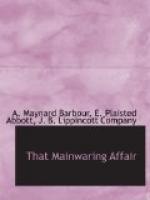“Can you produce the certificate of this marriage?” inquired the coroner, regarding the witness with a searching glance as she paused in her recital.
“Unfortunately,” she replied, in a tone ringing with scorn and defiance, “I cannot produce our marriage certificate, as my husband kept that in his possession, and frequently threatened to destroy it. If it is in existence, it will be found in his safe; but I can produce a witness who was present at our marriage, and who himself signed the certificate.”
“State the name of this witness.”
“Richard Hobson, of London.”
“You are then acquainted with this Hobson?” the coroner inquired, at the same time making an entry in the memorandum he held.
“Naturally, as he was at one time my husband’s attorney.”
“He called at Fair Oaks yesterday, did he not?”
“He did.”
“Do you know whether he called more than once?”
“He came a second time, in the evening, accompanied by his clerk.”
“Was his object at either time to secure an interview with Mr. Mainwaring?”
“He called to see me on private business.”
“Had he any intention of meeting Mr. Mainwaring later?”
“I know nothing regarding his intentions.”
“Mrs. LaGrange,” said the coroner, after a pause, “you were in Mr. Mainwaring’s library between the hours of eleven and twelve last night, were you not?”
Her face darkened with anger at his form of address. “I was in my husband’s library at that hour,” she replied.
“How long were you there?”
“I cannot state exactly,” she answered, indifferently; “perhaps half an hour.”
“Did Mr. Scott repeat correctly your words to Mr. Mainwaring?”
“I have no doubt that he did. His memory on the subject is much better than mine.”
“What was the meaning of your threat to Mr. Mainwaring, that you would make him and his friends regret the day’s proceedings?”
“He understood my meaning. He knew that I could set aside the will, and could ruin him by exposing his duplicity and fraud.”
“What reply did he make?”




